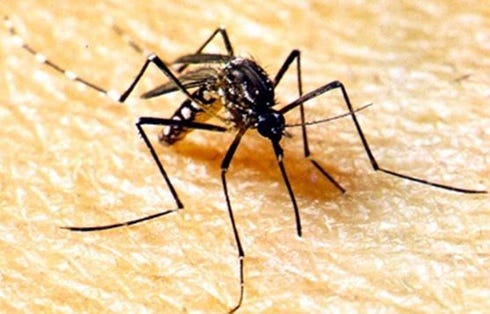
With news about the Zika virus spreading in Florida, now is the time to think about mosquito protection.
As the weather warms, mosquitoes hatch. Female Aedes aegypti mosquitoes lay their eggs in temporary flood water pools — even small ones such as pet watering bowls, bird baths and upturned magnolia or oak leaves. So dumping out collection containers and raking leaves every couple of days can greatly reduce the population.
Becoming infected with Zika virus is not common. Though mosquitoes, blood transfusions or sex can transmit the disease, Florida’s only known infections were from people who had been “bitten” by mosquitoes while traveling to countries with active virus outbreaks. That is, until this past week, when a person-to-person infection occurred between a man who had been infected while out of the country and the woman he returned to in Florida.
Mosquitoes usually obtain the virus by feeding on infected people, who may not exhibit symptoms because they have been exposed and their body has built immunity to the virus. Once the mosquito has drawn infected blood from the person, the infected mosquito “bites” another human, transmitting the virus mixed in saliva into the second host’s blood stream.
If the second host is a susceptible pregnant woman, there is a risk of birth defects for the unborn child. If the infected host is a man, he can transmit the virus in semen for about two weeks.
Public health officials in Florida can monitor mosquito-borne illnesses quickly and effectively. Though the daily news can be alarming, the awareness is truly the message.
Here are tips to protect yourself:
●Stay indoors at dusk (peak mosquito-biting time). If you must be outside, wear long sleeves and pants or mosquito repellents containing the active ingredient DEET.
●Repair torn door and window screens.
●Remove unnecessary outside water sources.
●Flush out water collected in outdoor containers every three to four days.
●Disturb or remove leaf litter, including roof gutters and covers on outdoor equipment.
●Apply larvicides, such as Bacillus thuriengensis israelensis to temporary water-holding areas and containers. Mosquitoes have been around all winter with the milder weather and frequent rain. As spring approaches, they will lay eggs on water surfaces they can find. As you get ready to spruce up the yard, look at all the ways you can remove potential habitats for the pesky creatures.
Sheila Dunning is an agent at the University of Florida's Institute of Food and Agricultural Sciences Extension office in Crestview.
University of Florida's Institute of Food and Agricultural Sciences Extension office classes include:
●March 16: “Bee Amazed,” 10-11 a.m., 127 W. Hollywood Blvd., Fort Walton Beach. Cost: Free
●March 17: Private Agriculture, Aquatic and General Standards Pesticide Licensing Training, 8 a.m. to 2 p.m., 3098 Airport Road, Crestview. Cost: $10 per session.
●March 17: Aquaponics, 6-8 p.m., 3098 Airport Road Crestview. Cost: $10.
UPCOMING CLASSES
This article originally appeared on Crestview News Bulletin: DUNNING: Do your part to stop the spread of Zika virus
